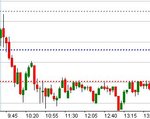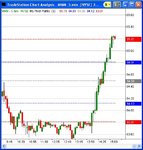Perrington
Active member
- Messages
- 145
- Likes
- 0
A lot of people appear to take a probability approach to trading. Iam going to question the validity of such a strategy by presenting some basic statistics that more or less everyone is aware of. I recently read Mark Douglas - Trading in the zone... hmmm Am I destined to be a loser because I dont agree with this gentleman's observations ? Ok, a lot of what he describes gets you thinking, and again a lot of what he says is downright confusing to say the least. I will say in his defence that some of his advice is positive in the way it can help you enjoy trading a bit more, and not worry so much. But what of his fundamental principle regarding thinking in probabilities ?
So, we have 2 possible directions, 1 is up the other is down (discounting sideways as you would break even if a market forever went sideways, which it doesn't do anyway) Now, this is a 50/50 chance of you being a winner or a loser based on the 2 possible outcomes. Another interesting figure that is "common knowledge" is that 10% of traders are successful (profitable) and 90% of traders are unsuccessful (crying to their bank managers).
Ok so we have a 50/50 chance of making money and yet only 10% do. Is it me, or do I sense a fundamental problem with regards to thinking in probabilities taking into consideration these statistics ? am I to assume that over the next century 90% will be winners and 10% losers to redress what has occurred over the previous century, or will the same scenario remain true ? I believe the latter to be the case, so therefore, I refute thinking in probabilites as a "required" strategy to becoming one of the 10%.
Is it a better strategy for the aspiring 10 percenter to focus on what appears to be market manipulation of a grand scale, trying to slot into the big player psychology state. Or should one brainwash themselves into believing that the market can be cracked by thinking in probabilities ?
Mark Douglas refers to minor and macro elements, minor being each and every individual tic being purely in the probability category defined by the number of possible variables that are in or about to participate in the market at any one time. Macro referring to a predictable trend occuring when observing these minor tics over a wider time frame. How do we jump from fractal chaos to observable trends if the market truely operates out of probabilities ? Is this not a fundamental contradiction, no matter how you look at it ? Is the more likely scenario being that the markets are manipulated giving the 10/90 ratio, and that most people dont have the capital or self discipline or downright devious mind to stay in the game long enough to figure out what is going on ?
So, we have 2 possible directions, 1 is up the other is down (discounting sideways as you would break even if a market forever went sideways, which it doesn't do anyway) Now, this is a 50/50 chance of you being a winner or a loser based on the 2 possible outcomes. Another interesting figure that is "common knowledge" is that 10% of traders are successful (profitable) and 90% of traders are unsuccessful (crying to their bank managers).
Ok so we have a 50/50 chance of making money and yet only 10% do. Is it me, or do I sense a fundamental problem with regards to thinking in probabilities taking into consideration these statistics ? am I to assume that over the next century 90% will be winners and 10% losers to redress what has occurred over the previous century, or will the same scenario remain true ? I believe the latter to be the case, so therefore, I refute thinking in probabilites as a "required" strategy to becoming one of the 10%.
Is it a better strategy for the aspiring 10 percenter to focus on what appears to be market manipulation of a grand scale, trying to slot into the big player psychology state. Or should one brainwash themselves into believing that the market can be cracked by thinking in probabilities ?
Mark Douglas refers to minor and macro elements, minor being each and every individual tic being purely in the probability category defined by the number of possible variables that are in or about to participate in the market at any one time. Macro referring to a predictable trend occuring when observing these minor tics over a wider time frame. How do we jump from fractal chaos to observable trends if the market truely operates out of probabilities ? Is this not a fundamental contradiction, no matter how you look at it ? Is the more likely scenario being that the markets are manipulated giving the 10/90 ratio, and that most people dont have the capital or self discipline or downright devious mind to stay in the game long enough to figure out what is going on ?


